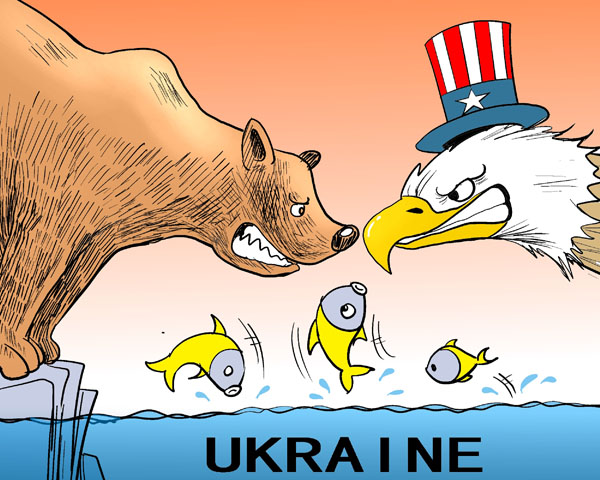Merkel, Putin, and the European balance of power
- By Heiko Khoo
 0 Comment(s)
0 Comment(s) Print
Print E-mail China.org.cn, August 5, 2014
E-mail China.org.cn, August 5, 2014
|
[By Jiao Haiyang/China.org.cn] |
Germany holds a dominant position in Europe and in European relations with Russia and the United States. These relations are governed by a variety of interests, the most important of which is the security of Europe's energy supply. The United States has invested heavily in shale gas, which will eventually enable the United States to wean itself from dependence on energy supplies from the Middle East and Venezuela. But Germany and Ukraine have few short-term options to replace Russian energy supplies. The recent $400bn Sino-Russian gas deal increases Russian state revenues and allows Russia to leverage its short-term advantages in Europe, notwithstanding any potential negative impacts that might follow from the downing of MH17. In the mean time, Russia can increase its energy efficiency and revenues by upgrading its antiquated infrastructure; its faulty pipelines currently lose 25% of the gas they carry.
Putin's challenge to the West over the situation in Ukraine and Crimea bolstered domestic support for his leadership and revived national pride. However, he has not generated these sentiments by mastering the dark arts of Machiavelli. His stance in defence of Russian interests tugs at the heartstrings of a broad sector of the population who experienced the collapse of the USSR as a national humiliation, similar to that suffered by Germany after its defeat in World War One. The gangs of adventurers and rag-tag militias drawn as if by a magnet to the fighting in Eastern Ukraine are composed of all sorts of dispossessed and angry men -- mostly right-wing militants and soldiers of fortune -- many of whom have already done battle in other parts of the former USSR, such as Chechenya, Transdinestra, Georgia, etc. They seek to avenge Soviet/Russian humiliation and indignity, viewing these conflicts as battles in a mystical nationalist and religious struggle, rather than as a part of a socio-economic, political, or class struggle. Analogies with the roaming bands of former soldiers in Germany after the First World War spring to mind.
The danger of far right ideologies and social movements gaining a powerful foothold in Russia is a real medium-term threat. Putin gained popularity through his nationalist rhetoric and his tough stance against the West over Crimea. But the pressures within Russian politics and the inner workings of the Russian state do not come from hidden "democratic" forces waiting to herald a pro-Western dawn. Rather, it is the forces of the far right that lurk in the wings. It was they who were baying for Russia to invade Ukraine earlier this year, and it is they who now sense that their time may have come.
The author is a columnist with China.org.cn. For more information please visit: http://china.org.cn/opinion/heikokhoo.htm
Opinion articles reflect the views of their authors, not necessarily those of China.org.cn.







Go to Forum >>0 Comment(s)